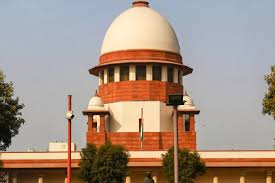SC reserves order on plea against actor Darshan’s bail in Renukaswamy murder case

The Supreme Court of India recently reserved its judgment on the Karnataka government’s plea. The plea challenges the bail granted to popular Kannada actor Darshan Thoogudeepa in the Renukaswamy murder case. This marks a key moment in the ongoing legal drama around this high-profile case.
Background of the Case
The case involves the murder of 33-year-old Renukaswamy. He allegedly sent obscene messages to actress Pavithra Gowda. This led to serious consequences. Police say Darshan, Pavithra, and others abducted and tortured Renukaswamy in a Bengaluru shed in June 2024. They held him captive for three days. Later, police found his body in a drain. The case shocked the public and sparked outrage.
Bail Controversy and High Court Decision
Darshan was arrested but later got bail from the Karnataka High Court on December 13, 2024. The government quickly challenged this bail in the Supreme Court. They argued the High Court’s decision lacked proper reasoning. The government stressed that such serious charges require keeping the accused in custody. They feared the accused could interfere with the investigation or intimidate witnesses if released.
Supreme Court’s Reaction
The Supreme Court bench, including Justices J.B. Pardiwala and R. Mahadevan, strongly criticized the High Court’s bail order. The judges called it a “perverse exercise of discretion.” They questioned whether the High Court properly applied its judicial mind. The Supreme Court noted inconsistencies in the lower court’s reasoning. The bench stressed the gravity of the charges and warned about risks if the accused remain out on bail.
The court’s intervention shows its strict approach to bail in serious criminal cases. It aims to protect the judicial process and ensure justice is served.
Legal Arguments Presented
The plea highlighted key points:
- Seriousness of the Crime: Murder with abduction and torture is a grave offense. Bail should be denied unless the accused meet strict conditions.
- Risk of Tampering: The accused may influence witnesses or destroy evidence if out on bail.
- Public Interest: Granting bail prematurely could hurt public trust in the justice system.
- Faulty Reasoning: The government said the High Court’s bail order failed to weigh the charges properly.
Current Status: Order Reserved
After hearing arguments, the Supreme Court reserved its order. The judges want time to consider all facts and legal points carefully. They have asked some accused’s lawyers to file written submissions within a week. This shows the court’s seriousness in handling this matter.
Public and Media Reaction
This case has drawn massive media attention. Many debates focus on whether the legal system treats celebrities fairly. Some fans support Darshan, claiming he is innocent. Others believe that fame should not protect anyone from the law.
Legal experts say the Supreme Court’s reserved judgment is a crucial step. It will clarify that the law applies equally to everyone, famous or not. The decision may also influence how courts grant bail in future high-profile cases.
Broader Implications
This case highlights important aspects of the Indian justice system:
- Judicial Review of Bail: The Supreme Court shows it will review bail decisions in serious cases.
- Celebrity Influence: The case exposes challenges in maintaining unbiased legal proceedings involving celebrities.
- Justice and Fairness: The judiciary must balance protecting the accused’s rights with ensuring justice for victims.
What Comes Next?
The Supreme Court’s verdict will determine Darshan’s legal status and affect the ongoing trial. The decision will also set an example for bail laws in serious criminal cases.
Investigations continue, and police will submit more reports. The public, media, and legal circles closely watch this case as it unfolds.
Conclusion
The Supreme Court’s reserved order signals a critical stage in the Renukaswamy murder case. It reflects the judiciary’s resolve to prevent any miscarriage of justice. As the nation waits, the case reminds us that the law should be impartial, regardless of the accused’s fame. The coming judgment will reveal how India’s highest court balances law, justice, and public trust in a sensitive case.






